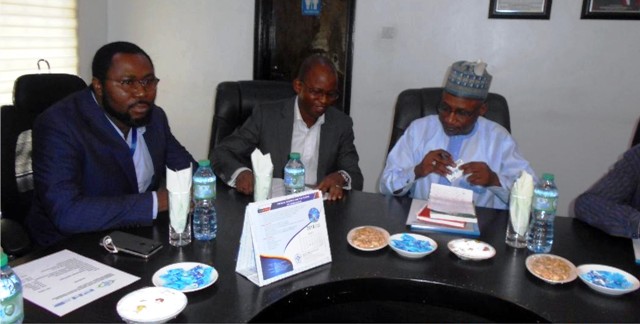Business
Ahiamakara Demolition: N139m Compensation Tears PHALGA Community Apart … EFCC Quizes Factions

The sum of N139million paid to Rebisi Central Age Group by the Rivers State Government as compensation for the demolition of Ahiamakara market at Waja area of Port Harcourt City Local Government Area of Rivers State is currently causing crisis among three groups in Rebisi Kingdom.
The Tide gathered that the two opposing camps in Rebisi Council of Chiefs and Elders are at loggerheads over the compensation sum of N139 million paid for the demolition of market shades being managed by a socio-cultural organisation, Rebisi Central Age Group.
The Tide source hinted that the N139 million is now a subject of investigation by the anti-graft agency, the Economic and Financial Crimes Commission (EFCC).
The sources further hinted that all the groups have been invited by the anti-graft agency for questioning.
Those invited include the leadership of Central Age Group and the other chiefs led by Chief Azubuike Nmerukini and Eze Uche Elikwu.
It was also learnt that the Rebisi Central Age Group headed by Elder Bennett Amadi as president general, Sunny Chuku as Secretary and Godspower Owhonda as treasure, respectively were petitioned by Rebisi Owhor Holders Council and Elders and Chiefs of Rebisi Kingdom in the Port Harcourt City Local Government Area.
The chiefs, in a petition by their counsel, U.G. Nwokocha alleged that the leadership of the age group and others tampered with the sum of N139 million paid as compensation by the state government for the acquisition of the said expanse of land and the payment was made through Zenith Bank into the account of Rebisi Central Age Group domiciled at First Bank of Nigeria PLC.
The petition urged the financial crimes agency to stop those concerned from the disbursement of the said sum of money, stressing that if not stopped, nothing would be left for the entire Rebisi Kingdom as they claimed that the demolished property was owned by the entire kingdom but managed by the Central Age Group.
It was also gathered that two weeks ago, the leadership of the Rebisi Central Age Group summoned a meeting of all Chairmen and secretaries of age groups affiliated to the Central Age Group and informed them that the President was made to sign an undertaking by the chiefs and elders headed by Nmerukini and Elikwu to return the sum of N69million to his group of chiefs and elders’ council.
According to the sources, this threat made the president general, to transfer the sum of N69 million from the coffers of the Central Age Group to the chiefs headed by Chief Nmerukini and Elikwu after the disbursement of N1.5million to each age group affiliated to the central age group.
It was on that note that the other group headed and a contender to the throne of Eze Apara Rebisi, Eze Victor Worluchem petitioned the Rebisi Central Age Group and other chiefs to return the said sum of N139 million to Rebisi kingdom.
Meanwhile, when contacted, the President General of Rebisi Central Age Group, Benneth Amadi confirmed that he was invited by the EFCC, last Thursday, and explanations were given as the area concerned was managed by the group.
Amadi regretted that the compensation had brought so much interest, but added that all along the Rebisi Central Age Group has been managing the stores and expanse of land which the money was paid for.
He argued that the expanse of land belongs to the Central Age Group, adding that the group has a judgment to that effect.
Nmerukini and Elikwu could not be reached for comment, but one of the chief whose counsel wrote the petition,Chief Cyprian Worenwu confirmed that they were all going to EFCC to sort out the issue.
He vowed that the alleged Eze Apara Rebisi Chief Victor Worlechem and his group of chiefs and elders would ensure that all legal means were exhausted to get the compensation to the owners.
‘’Our prayers is to the further sharing of the N139million and the N69million handed over to Eze Elikwu and Chief Nmerikini be retrieved immediately because the money was meant for all Rebisi indigenes and not a particular group.
When contacted, the Head, Public Affairs, Port Harcourt zone of the EFCC, Dele Oyewale confirmed that the commission was still investigating the matter, adding that those involved were also in the office of the commission for another round of interrogation, yesterday.
Oyewale said the commission would give those involved fair hearing while investigations are still on.
Business
Two Federal Agencies Enter Pack On Expansion, Sustainable Electricity In Niger Delta

Business
Why The AI Boom May Extend The Reign Of Natural Gas

Business
Ogun To Join Oil-Producing States ……..As NNPCL Kicks Off Commercial Oil Production At Eba

-

 Sports4 days ago
Sports4 days ago2026 WC: Nigeria, DR Congo Awaits FIFA Verdict Today
-
Politics4 days ago
ADC, PDP, LP Missing As INEC Set For By- Elections In Rivers
-

 Environment4 days ago
Environment4 days agoOxfam, partners celebrate 5 years of climate governance programmes in Nigeria
-
Politics4 days ago
FG’s Economic Policies Not Working – APC Chieftain
-

 Politics4 days ago
Politics4 days ago2027: Diri Unveils RHA LG Coordinators, APC Congress Panel
-

 News3 days ago
News3 days agoVictory Over Insurgency Certain, Tinubu Assures
-

 Politics4 days ago
Politics4 days agoReps To Meet,’Morrow Over INEC’s 2027 Election Timetable
-

 Politics4 days ago
Politics4 days agoGroup Continues Push For Real Time Election Results Transmission

